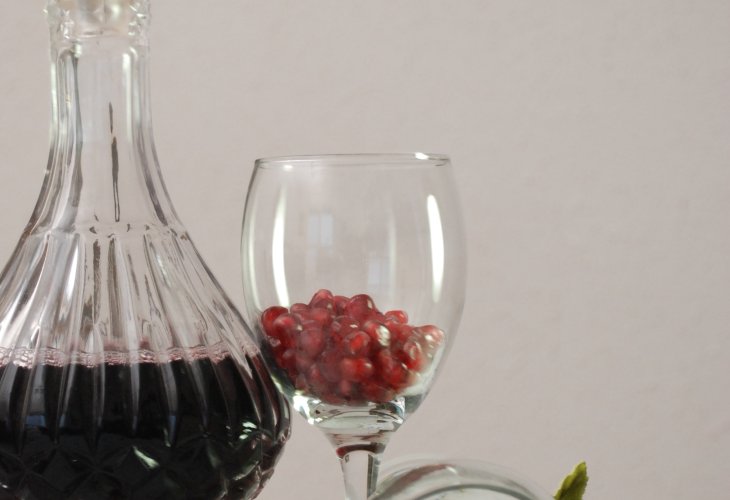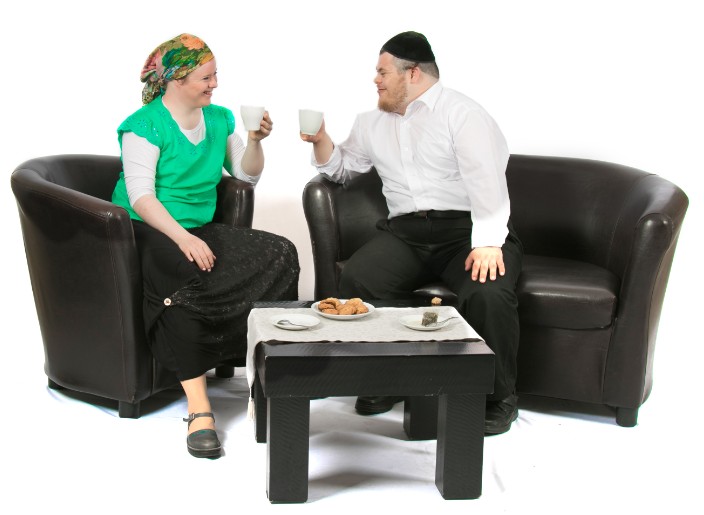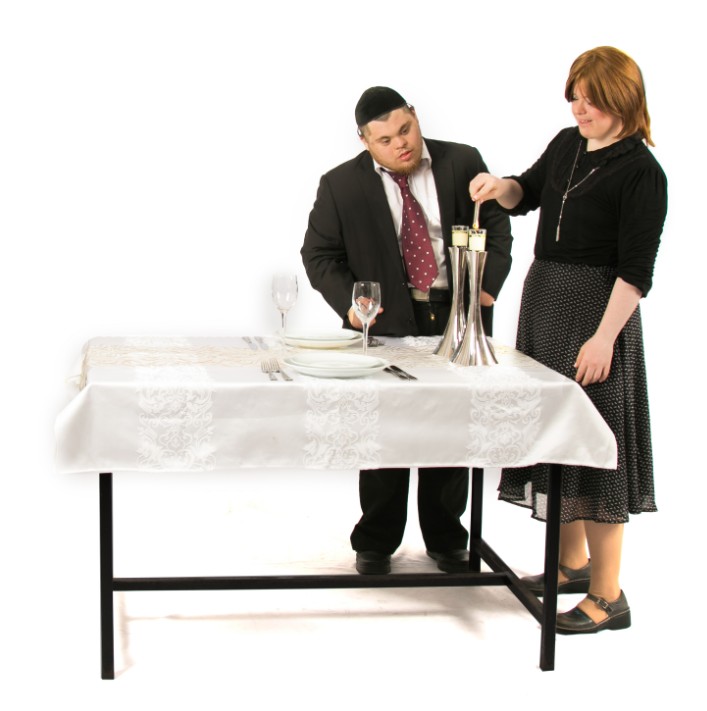"If I Had Known in Advance That My Son with Down Syndrome Would Marry and Build a Home, I Wouldn't Have Cried for a Moment"
When Avichai Ben Baruch was diagnosed with Down syndrome, his parents decided to adopt Karen, also a baby with Down syndrome, so he wouldn't be alone. They never dreamed that twenty years later, they would stand under the chuppah. Recently, Avichai and Karen celebrated their fourth wedding anniversary, living happily, working, and satisfied.

Four years have passed since the day Avichai covered Karen with a veil and they stood under the chuppah, according to the law of Moses and Israel. Four years have passed since that unique wedding. Unique in every sense of the word, as Avichai and Karen Ben Baruch are a special couple. Both have Down syndrome.
For those who find it impossible, note that their story is even more special – for years, Avichai and Karen grew up as step-siblings in the same family, as Karen joined the Ben Baruch family, Avichai's family, when she was only a few days old, while Avichai was merely one year old.
"Karen is like our daughter," says Chaya Ben Baruch, the mother. "Twelve years ago, we traveled to the Western Wall to celebrate Avichai's Bar Mitzvah and Karen's Bat Mitzvah during the same week. My husband went with Avichai to the men's section and I went with Karen to the women's section. When we came out, Avichai said to me: 'Mom, I prayed for Karen to be my bride.' I laughed, and when Karen came out, I said to her: 'Did you hear, Karen? He wants you to be his bride.' To my surprise, Karen didn’t laugh but gave me a look of 'Mom, you don't understand anything.'"
Over the years, Chaya attests that they always talked about their future wedding, and these were serious conversations as they discussed matters of great importance. Seven years later, when Karen was nineteen and Avichai twenty, their parents led them to the chuppah with not a dry eye among the guests.

Don’t Judge by Appearances
Although the Ben Baruch family can now be an endless source of information about Down syndrome, Chaya recalls that until Avichai was born, she had hardly heard about the syndrome. "We lived in Alaska, and we had two healthy sons. Before Avichai's birth, I took all the required tests and was told nothing was unusual. Avichai was born on time, and since I am a midwife by profession, I noticed he had folded ears. I asked the midwife if there was a chance my child had Down syndrome, and she said there was no reason to worry and even provided proof - children with Down syndrome typically have only one line on their palm, which is one of the characteristics, but Avichai was born without it. A few days later, we were discharged home, but I still wasn’t at peace. I decided to take Avichai to the pediatrician, and then the bombshell was dropped - it turned out not only did he have Down syndrome, but he also had a severe and life-threatening heart defect that wasn’t detected at birth."
Chaya notes that when Avichai was only three months old, he underwent an open-heart surgery. "I came to the hospital and begged the doctors not to see him as an unusual baby whose life was somehow less valuable than a normal child's, because he is my child and I want him healthy and whole. Eventually, he was released home after only four days, despite the complicated surgery. I saw it as a sign from Heaven that Hashem was watching over him."
Several months later, Chaya and her husband attended a lecture for parents of special children, where one of the mothers, who had twins that died at age 18 from a rare genetic disease, spoke about the comfort of having each other along the way. As soon as Israel and Chaya left the hall, they decided without doubt: "We will adopt a child with Down syndrome, so Avichai won’t be alone."
"I will never forget the day Karen first arrived at our home," Chaya recalls. "Karen was born into a very respected family, and she had a four-year-old brother. We arranged for her parents to come at ten o'clock in the morning, and they indeed arrived at our house with the baby, the older child, and the grandmother. We thought they were coming just to get to know us, but ultimately it became clear they intended to leave the baby and go. Karen’s family left, and since then she became our daughter. Although we offered, they chose not to meet her again."
 (Photo: A. Edri Tzohar HaLev)
(Photo: A. Edri Tzohar HaLev)Here, Chaya wishes to address other parents who find themselves in such a situation: "It is truly not easy to hear the news that the baby born to you is unique. When Avichai was born, I too was very worried and feared for his future life. I constantly thought – if something were to happen to me one day, who would be with him? Who would take care of Avichai? And I want to say one thing: if when he was a baby, someone had told me that in twenty-five years, Avichai would be happily married and living an hour and a half’s drive from me, at that moment all my fears and worries would have ended. I wouldn’t have cried for a moment."
She also adds: "Marriage is entirely possible for some people with Down syndrome, especially since 99% of men with Down syndrome are infertile, so there’s no real likelihood of bringing children into the world. The marriage is simply to allow them to establish a home and not be dependent on their family. There are hostels today where special couples live with full supervision, and we need to give them the opportunity."
Disappointment in Israel
After the Ben Baruch family lived in Alaska for a few more years, they decided to move to Israel. "This was because we became stronger in Judaism," Chaya explains. "We wanted to move to the Jewish land and also assumed that in Israel, they surely care for the welfare of others, and it would be easier for us to raise the children."
Their assumption was quickly met with disappointment. "Initially, we planned to live in a kibbutz, but in all the kibbutzim, they told us: 'We have enough to handle with our own problematic children, we don’t need more.' Even in religious cities, we couldn’t find a place that would welcome us. Eventually, we arrived in Safed, but even there, the children weren’t accepted into kindergartens and institutions. To be honest, we considered returning to Alaska, but after consulting with a renowned yeshiva head, he told us, 'Stay in the country, and you will see miracles and wonders.'"
Indeed, over the years, public awareness has grown. "People used to cross the street when they saw Avichai in the street, but today people of all types—religious, secular, even with a ponytail and an earring—stop Avichai in the street and ask how he is and show interest. There's no doubt our society has undergone a transformation."
 (Photo: A. Edri Tzohar HaLev)
(Photo: A. Edri Tzohar HaLev)Since Avichai and Karen got married, Chaya says happiness has filled the house. "Initially, they lived in our building, on the ground floor, but very quickly they moved to live in Rechasim, an hour and a half drive away. They live near the 'Tzohar La’Tohar' institution—a special education institution, and there is a housemother who accompanies them. Avichai works in a salt production factory of the institution, and Karen works at Rabbi Emmanuel Tehila's home in Rechasim. They are so loved there, they are practically like family to them. On Shabbats, they usually come to visit us in Safed, and we are so happy when they come. Every time, I am again moved by their wonderful relationship. For example, a few months ago, Tzohar La’Tohar organized a trip to Prague for boys, and Avichai joined. When he returned to the country, the housemother told me: 'You have no idea how happy he was to see his wife waiting for him. If only my husband would treat me like that after not seeing me for a few days.'"
And she has another story, fresh from last week: "Avichai and Karen wanted to buy a new sofa for their house. They looked at an IKEA catalog and saw a beautiful blue sofa and another iron sofa that could open up into a bed. In a womanly manner, Karen wanted a beautiful sofa, and Avichai preferred an openable one. Eventually, the housemother went out with Karen to IKEA and when they were there, they called Avichai and told him: 'We are in the store right now, and there are two options – a blue sofa or an iron one, what do you say?' Without thinking twice, Avichai answered: 'I want what my wife wants.' "And the most amazing thing," Chaya says excitedly, "is that when the call ended, the housemother asked Karen, and what do you want? And she replied without hesitation: what my husband wants."
Chaya tells all of this while getting repeatedly teary from emotion. "People with Down syndrome are so righteous and special, with high souls. Unfortunately, not everyone recognizes this, and that's why I personally see it as my mission to help families with a special child and are so shocked that they struggle to make a decision and don’t know whether to take them home or not. I feel it’s both a privilege and an obligation to explain to these families the great uniqueness these children have, and if they still decide that it’s not suitable for them to raise the child, then I accompany them until a suitable family is found."
Watch: A moving video of the couple's wedding anniversary celebration
Contact Chaya Ben Baruch: 0526402426 / chaya2426@gmail.com

